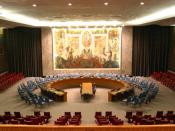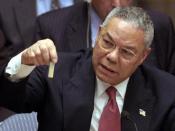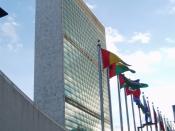The United Nations is a direct descendent of the League of Nations, begun as a result of the First World War, and committed to peace and international security. Nations involved with the League of Nations were very much concerned with their own interests and major world issues were ignored, such as Germany's rearmament program and Japan's invasion of China. The breakout of World War II signalled the end of the League of Nations but the concept was seen to have been successful, and in 1945 a new organisation, the United Nations was chartered and committed to by the first 51 member states.
The Cold War had begun even before World War II was over, William R. Hawkins asserts online at (www.nationalreview.com/comment/comment-hawkins013103.asp) and a shift in power put nations formerly enemies up against the new enemy of communism, in the form of the USSR and China. The U.N. was relegated to the sidelines of world politics but since the end of the Cold War in 1991 with the increased burden of arms costs proving too difficult for the USSR to meet, it has been expected to take a more central role in global government.
Since Secretary-General Kofi Annan came into office in 1997 many steps have been taken towards this end, with better organisation being undertaken to develop coordination between the different arms of the U.N. but his power is still restricted by the multiple numbers of agencies and bodies within the U.N. Another step Annan proposes is links between businesses and the U.N. but many believe this is wrong as the United Nations is supposed to be a body that opposes violation of human rights, and many businesses, such as GAP and Nike are well-known for blatantly violating workers rights and other basic rights.
Groups set up to combat the...


